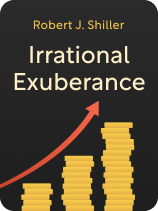

This article is an excerpt from the Shortform book guide to "Irrational Exuberance" by Robert J. Shiller. Shortform has the world's best summaries and analyses of books you should be reading.
Like this article? Sign up for a free trial here.
How is the efficient market hypothesis explained by experts? What does it mean, and what are some counterarguments?
The efficient market hypothesis, explained by financial experts, concludes that securities are always priced accurately due to the nature of the market. By understanding this hypothesis and the counterarguments to it, you’ll have a better understanding of how markets work.
Learn more about the efficient market hypothesis from all angles.
Speculative Bubbles and the Efficient Market Hypothesis
Although speculative bubbles affect numerous investing markets, many academics argue that such bubbles are actually impossible. These observers embrace the efficient market hypothesis, explained as the thesis that financial markets perfectly reflect all available information about securities (financial assets that you can buy and sell), meaning that securities are always accurately priced. For this reason, they maintain that speculative bubbles don’t exist because such bubbles would entail that securities are systemically mispriced.
Against this argument, other experts argue that the efficient market hypothesis (EMH) is flawed because in practice, the stock market is more volatile than we’d expect it to be if it were perfectly efficient. According to many economists, stocks’ dividends—the payments that companies distribute to shareholders—reflect companies’ intrinsic value (that is, their fair price) over the previous year. Thus, if the stock market were perfectly efficient, share prices should correspond neatly to future dividend prices, because these dividends reflect companies’ current intrinsic value. For example, in an efficient market, Tesla’s 2022 stock price should correspond with its dividends at the beginning of 2023, because these dividends reflect Tesla’s intrinsic value throughout 2022.
However, no such tight correspondence between future dividends and present share price exists. To the contrary, an earlier article shows that future dividend movements don’t explain the volatility of share prices. Although these dividend movements can explain the general trend of share prices, they can’t explain the fluctuations these prices experience in the shorter term. For this reason, the EMH can’t be entirely accurate.
| Thaler and De Bondt’s Overreaction Argument Against the Efficient Market Hypothesis Although this argument against the EMH made waves in 1981, another potent argument against this hypothesis was published just four years later, in 1985, by Nobel laureate Richard Thaler and William De Bondt. Thaler and De Bondt attempted to refute the EMH by arguing that it was incompatible with the market phenomenon of overreaction–the fact that stocks that outperform the market average in a given period tend to subsequently underperform it, and vice versa. Thaler and De Bondt point out that according to the EMH, it should be impossible to reliably predict whether a stock will increase or decrease in value based on its past market performance. After all, if we could determine that a stock would increase in value, that would mean that it’s currently undervalued, contrary to the EMH’s claim that stocks are always accurately priced. For certain stocks, however, they argued that you could use previous market performance to accurately predict future stock performance. To show as much, they conducted a study that identified the most successful and unsuccessful stocks on the New York Stock Exchange for a variety of three- to five-year periods, then analyzed their stock growth over subsequent time periods. They found that the least successful companies (that is, those that most underperformed in relation to the market) went on to outperform the market by an average of 30% in the subsequent three- to five-year periods. By contrast, companies that had previously outperformed the market by the highest margin went on to underperform by 10% in the subsequent periods. This finding appears to validate skepticism of the EMH—if stock prices don’t correspond to company performance, and if we can reliably identify mispriced stocks and predict their future price corrections, it would appear that stock prices aren’t strictly rational. |
Past and Present Market Efficiency
Nonetheless, proponents of the EMH often respond by claiming that, although the stock market wasn’t historically efficient, it has recently become efficient as investors have learned the true value of stocks.
To accept this response, you must accept that the market’s currently inflated CAPE ratios are in fact rational. EMH proponents thus argue that these higher CAPE ratios are justified because investors learned that stocks have been undervalued throughout US history. According to this reasoning, investors are justified in bidding up stock prices because they have learned that stocks consistently outperform other investing assets.
(Shortform note: Instead of arguing that stocks have consistently outperformed other securities, defenders of presently inflated CAPE ratios often point to another justification: low interest rates since 2008. According to one expert, when the federal interest rate (that is, the risk-free interest rate at which banks lend money to one another) is below its historical average, that tends to stimulate economic growth because companies can more easily borrow money. This increased economic growth leads investors to expect higher earnings in the future, allegedly justifying higher CAPE ratios.)
But this line of reasoning is unfounded. First, in the ten years following two previous peaks in CAPE ratios—September 1929 and January 1966—short-term bond rates actually outperformed returns from the stock market. In a similar vein, in the thirty-year periods leading up to 2010 and 2011, prominent corporate bond indices outperformed the S&P 500. Evidence simply doesn’t support the thesis that stocks have consistently outperformed bonds—leaving us no reason to believe that the present high CAPE ratios are justified.
(Shortform note: Although this may be correct that stocks haven’t consistently outperformed bonds historically, they have in recent history: Between 2013 and 2023, the S&P 500’s corporate bond index hovered around 2% annual returns, whereas the S&P 500 itself delivered nearly 10% annual returns in this same timeframe.)

———End of Preview———
Like what you just read? Read the rest of the world's best book summary and analysis of Robert J. Shiller's "Irrational Exuberance" at Shortform.
Here's what you'll find in our full Irrational Exuberance summary:
- That financial markets are rife with speculation
- The three key US financial markets where speculative bubbles have formed
- Recommendations to financial leaders and the public for mitigating bubbles






